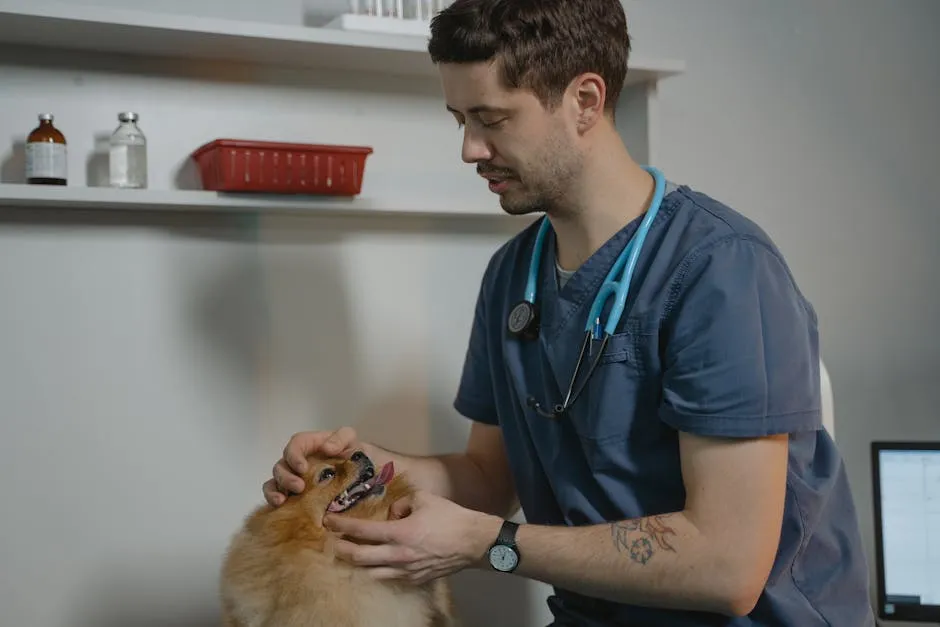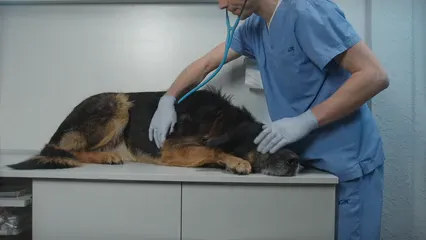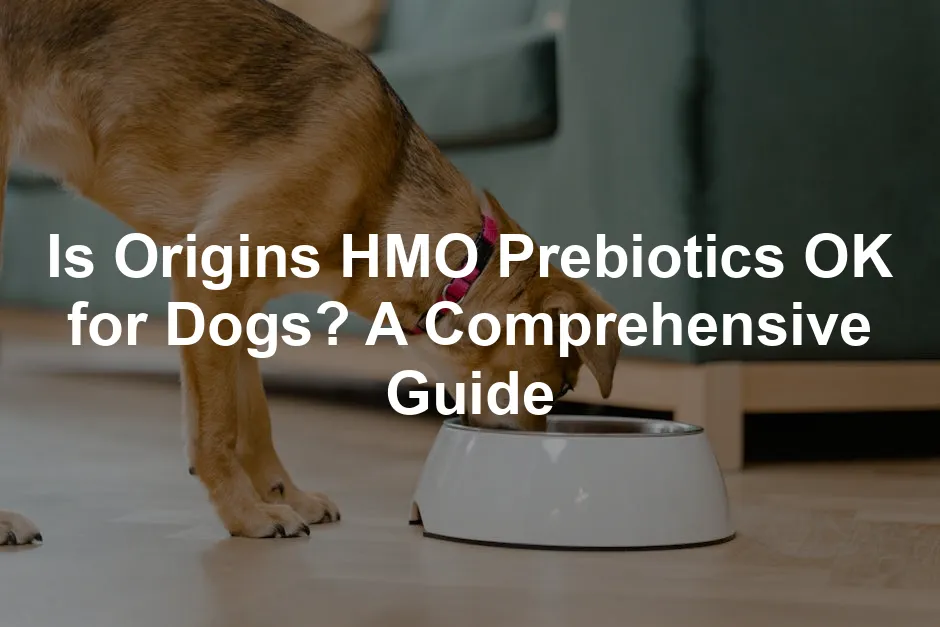Introduction
Dog nutrition has become a hot topic. With more pet owners seeking to provide optimal diets, prebiotics and probiotics are gaining traction. These supplements can promote gut health and overall well-being in our furry friends. Among the trending options is Origins HMO prebiotics, specifically designed to support digestive health.
But are these human-targeted prebiotics suitable for dogs? It’s essential to understand how canine dietary needs differ from ours. While HMOs (Human Milk Oligosaccharides) are beneficial in human diets, can they provide the same perks for our canine companions?
Here’s a fun fact: Did you know that a dog’s gut microbiome is similar to that of a human infant? This might make you wonder if HMOs could work wonders for your dog’s digestion, just as they do for babies. However, before you rush to sprinkle Origins HMO on your pup’s food, let’s break down the facts and find out if it’s safe for your four-legged friend.

Summary of Key Points
To start, HMOs are complex carbohydrates that help maintain gut health. They play a significant role in promoting the growth of beneficial bacteria. However, using human-specific supplements for dogs raises concerns.
Key points to consider include:
- Understanding HMOs and their benefits.
- Evaluating the safety of HMOs for dogs.
- Exploring alternatives and recommendations for dog-friendly prebiotics.
Curiously, recent research highlights surprising insights about canine gut health. Could the findings shift our understanding of dog nutrition? Stick around as we unravel the details.

Understanding HMOs and Their Benefits
What Are Human Milk Oligosaccharides (HMOs)?
Human milk oligosaccharides (HMOs) are complex carbohydrates found abundantly in human breast milk. They serve as prebiotics, nourishing beneficial gut bacteria and promoting overall gut health.
In humans, HMOs are known to enhance the immune system and improve gut microbiome diversity. They act as a food source for beneficial bacteria, helping to maintain a healthy gut balance. In essence, they’re multitaskers in the digestive world.
While these benefits are well-documented for humans, the question remains: do they hold the same promise for our dogs? As pet owners, we must tread carefully and consider the differences in our dietary needs compared to those of our canine friends.

Is Origins HMO Prebiotics Safe for Dogs?
Strain Concerns
When it comes to the specific strains in Origins HMO prebiotics, things get a bit murky. The product touts its inclusion of human milk oligosaccharides, primarily designed for human consumption. While these oligosaccharides promote gut health in infants, their safety and efficacy for dogs remain unproven.
Most importantly, the strains used in Origins HMO haven’t undergone rigorous testing for canine health. Imagine giving your dog a snack that’s only been tested on humans! That’s a recipe for uncertainty. Without solid research backing these strains, we must proceed with caution. After all, just because something is good for humans doesn’t mean it’ll be a hit with our furry friends.

For those looking for a dog-specific supplement, consider trying Origins Canine 5-in-1 Supplement. This product is specifically formulated for dogs and includes beneficial strains tailored to their digestive needs. Your pup will thank you for it!
Formulation Issues
Let’s chat about digestibility. Human milk oligosaccharides are not exactly the same as the nutrients dogs typically consume. Dogs have different digestive systems, and what works wonders for infants could result in a tummy ache for Fido.
The formulation of Origins HMO prebiotics raises concerns about potential digestive upset. Some dogs may experience bloating, gas, or even diarrhea from these oligosaccharides. It’s like trying to teach your dog to fetch a stick when all it wants to do is chase its tail.
Moreover, human milk oligosaccharides are designed for human physiology, which means they might not break down as expected in a canine digestive tract. This could lead to unwanted surprises in the yard, if you catch my drift.

Dosage Unknown
Here’s where things get a bit sticky. There’s currently no established dosage for dogs when it comes to Origins HMO prebiotics. The lack of clear guidelines is like trying to navigate a maze without a map—frustrating and risky!
Without a proper dosage, pet owners may inadvertently give their dogs too much or too little. Improper dosing can lead to digestive issues or, worse, inadequate support for gut health. It’s essential to remember that what works for humans may not translate well to dogs.
Veterinarians recommend caution when introducing any new supplement without established guidelines. So, until more research comes to light, it’s best to consult your vet before considering Origins HMO for your pup. Your furry friend deserves the best, and we want to make sure they’re safe and sound!

Expert Recommendations
Veterinarians generally advise against using human-targeted supplements for dogs. While human supplements, like Origins HMO prebiotics, may appear beneficial, they often lack the necessary research to confirm their safety for canine consumption. Dogs have distinct digestive systems, and what works for humans might not suit our furry friends.
Before introducing any new supplements, consulting a veterinarian is essential. Every dog is unique, and a vet can provide tailored advice based on your dog’s health, age, and dietary needs. Remember, when it comes to your dog’s well-being, a little caution goes a long way!

Alternatives to HMOs for Dogs
Best Prebiotics for Dogs
When considering prebiotics for your dog, it’s crucial to opt for dog-safe options. Here are some top choices:
- Inulin: A natural fiber found in chicory root, inulin supports healthy gut bacteria and is safe for dogs. You can find Inulin Powder to easily supplement your dog’s diet.
- Fructooligosaccharides (FOS): Similar to inulin, FOS encourages the growth of beneficial bacteria in the gut. You can grab a Fructooligosaccharides (FOS) Supplement to enhance your dog’s gut health.
- Mannanoligosaccharides (MOS): Derived from yeast, MOS helps maintain gut health and supports immune function. Check out Mannanoligosaccharides (MOS) Supplement for a boost to your dog’s digestion.
- Psyllium Husk: This soluble fiber promotes regularity and is often used to manage digestive issues. A great option is Psyllium Husk Powder.
- Veterinary-formulated Probiotics: Products like Origins Canine 5-in-1 supplement are tailored for dogs. They contain strains specifically selected for canine digestive health, ensuring safety and efficacy.
Veterinary-formulated options often outperform human-targeted products. They’re designed with your dog’s unique needs in mind, minimizing the risks associated with unsuitable ingredients.

Homemade Probiotics and Prebiotics
If you’re feeling adventurous, homemade options can also boost your dog’s gut health. Here are some safe, simple ideas:
- Plain Yogurt: Look for plain, unsweetened yogurt. It contains live cultures beneficial for gut health. Just a spoonful mixed into their food can work wonders. You can use Plain Yogurt for Dogs for a quick addition to their meals.
- Kefir: This fermented milk drink is rich in probiotics. Dogs often digest it well, making it a tasty treat. Grab Kefir for Dogs to give them a delicious probiotic boost.
- Fermented Vegetables: Small amounts of sauerkraut or kimchi (without spices) can introduce beneficial bacteria. Just a tiny bit goes a long way. Try Organic Sauerkraut for a healthy addition.
- Bone Broth: Not only is bone broth nutritious, but it also supports gut health. It’s easy to make by simmering bones and water, then straining it. You can also try Bone Broth Powder for convenience.
- Pumpkin Puree: A fantastic source of fiber, plain canned pumpkin (not the spiced pie filling) can aid digestion. Mix it into their food for a tasty addition. Stock up on Canned Pumpkin Puree for easy meal prep.
Remember, introducing new foods should always be gradual. Monitor your dog for any adverse reactions. If in doubt, consult your vet to ensure these homemade goodies are suitable for your pup’s unique needs. Happy cooking!

Signs Your Dog May Need Probiotics
Is your dog acting a bit off? Here are some signs that might indicate your pooch could benefit from probiotics:
- Soft or Loose Stools: If the tail-wagging champion is leaving behind a messy backyard surprise, it’s a clear sign of digestive distress.
- Excessive Gas or Burping: If your pup’s toots could clear a room, it may mean their gut flora is out of balance.
- Recurring Skin Issues: If your dog’s coat looks more like a patchwork quilt than a luxurious fur coat, it could be linked to gut health.
- Ear Infections: Frequent trips to the vet for ear infections might mean there’s an imbalance in your dog’s gut microbiome.
- Unusual Anxiety or Stress: Probiotics can sometimes help calm a nervous dog, as gut health can influence mood.
- Antibiotic Use: If your dog has recently had antibiotics, they may need probiotics to replenish good bacteria.
Monitoring your dog’s health is essential. Keep an eye on their bathroom habits, energy levels, and overall demeanor. If you notice persistent symptoms, consult your veterinarian. They can provide tailored advice and help determine if probiotics are the right choice for your furry friend.

Risks of Excessive Probiotics for Dogs
Probiotics can be beneficial for dogs, but too much of a good thing can lead to trouble. Here’s what you need to know about the risks of overdoing it:
Excessive probiotics can lead to mild digestive issues. Symptoms may include gas, bloating, or discomfort. Think of it as your dog’s gut throwing a tantrum because it’s overwhelmed. It’s crucial to follow the recommended dosages to minimize these risks.
Dogs can also experience more severe reactions if given too many probiotics. If you notice changes in appetite, lethargy, or any signs of distress, it’s time to hit pause on the probiotics and consult your vet.
Understanding your dog’s specific needs is paramount. Not all dogs respond the same way to probiotics, and factors like age, size, and health can affect how they react. For instance, a small dog and a large breed will have different tolerances.
When introducing any new supplement, start slow. Gradually increase the dosage to give your dog’s system time to adjust. This way, you can monitor how they respond without overwhelming their gut.
If you suspect your dog is having any adverse reactions, don’t hesitate to reach out to your veterinarian. They can help determine if probiotics are suitable or if adjustments are necessary. After all, a happy gut contributes to a happy dog!

Conclusion
In conclusion, Origins HMO prebiotics may not be the best fit for your dog. While they boast benefits for humans, their safety and efficacy for our furry friends remain unproven. It’s essential to consult a veterinarian before introducing any new supplements into your dog’s diet.
Prioritizing your dog’s health is crucial. Choosing appropriate dietary supplements will ensure your pup thrives. Remember, just because something works wonders for humans doesn’t mean it’s a one-size-fits-all solution for dogs.
We’d love to hear about your experiences! What dietary needs have you found beneficial for your dog? Share your stories and tips in the comments below. Your insights could help other dog owners navigate the sometimes tricky world of canine nutrition. Together, let’s keep our four-legged friends healthy and happy!

FAQs
Are HMOs beneficial for dogs?
The buzz around HMOs (Human Milk Oligosaccharides) might sound promising, but when it comes to dogs, the evidence is lacking. While these oligosaccharides are celebrated for their benefits to human gut health, research supporting the same for dogs is sparse. Most studies focus on their effects in infants, leaving a gap for canine health. The bottom line? There’s no solid proof that HMOs provide benefits for our furry friends. So, before you sprinkle them on your dog’s kibble, it’s wise to consider this uncertainty.
What are the best prebiotics for dogs?
When choosing prebiotics for your pup, steer clear of human-targeted options. Here are some dog-safe prebiotics that can support gut health: 1. Inulin: Derived from chicory root, inulin is a fiber that promotes beneficial gut bacteria. 2. Fructooligosaccharides (FOS): These oligosaccharides encourage the growth of good bacteria, similar to inulin. 3. Mannanoligosaccharides (MOS): Sourced from yeast, MOS helps maintain gut health and supports the immune system. 4. Psyllium Husk: This soluble fiber can aid digestion and manage gastrointestinal issues. 5. Veterinary-Formulated Probiotics: Options like the Origins Canine 5-in-1 supplement are crafted specifically for dogs, ensuring safety and effectiveness. Selecting prebiotics tailored for dogs is key to promoting their digestive well-being.
Can I give my dog human probiotics?
Ah, the age-old question: can we share our probiotics with our canine companions? While some human probiotics may seem harmless, they often come with safety concerns for dogs. First, human probiotics are not tested for canine digestion, meaning they could cause digestive upset. Second, some ingredients in human probiotics may be harmful to dogs. If your pup needs probiotic support, it’s best to stick to veterinary-formulated options designed specifically for dogs. Your furry friend’s gut health will thank you!
How do I know if my dog needs probiotics?
Wondering if your dog might benefit from probiotics? Keep an eye out for these signs: 1. Soft or Loose Stools: If your dog’s business isn’t solid, it could indicate digestive distress. 2. Excessive Gas or Burping: If your pup’s toots could clear a room, it may be a sign of an imbalanced gut. 3. Recurring Skin Issues: Unwanted skin problems might link back to gut health. 4. Frequent Ear Infections: If your dog constantly battles ear infections, it could stem from gut flora imbalances. 5. Unusual Anxiety or Stress: Probiotics can help calm anxious pups, as gut health affects mood. 6. Recent Antibiotic Use: If your dog has had antibiotics, they may need probiotics to replenish good bacteria. Monitoring your dog’s health is essential, and if symptoms persist, consulting a veterinarian is the way to go.
What should I do if my dog has digestive issues?
If your dog is experiencing digestive troubles, don’t panic! Here are some steps to take: 1. Observe: Keep an eye on your dog’s symptoms. Are they vomiting, having diarrhea, or showing discomfort? 2. Modify Diet: Consider switching to a bland diet, like boiled chicken and rice, for a short period. 3. Hydration: Ensure your dog stays hydrated, especially if they have diarrhea. 4. Consult Your Vet: If symptoms persist for more than 24 hours or worsen, it’s time to call the vet. They can help determine the underlying cause and recommend appropriate treatment. Monitoring and seeking help when needed can ensure your furry friend gets back to their happy, tail-wagging self in no time!
Please let us know what you think about our content by leaving a comment down below!
Thank you for reading till here 🙂
If you’re curious about common health concerns for dogs, especially skin issues, check out this article on understanding and treating common skin issues in dogs.
All images from Pexels





